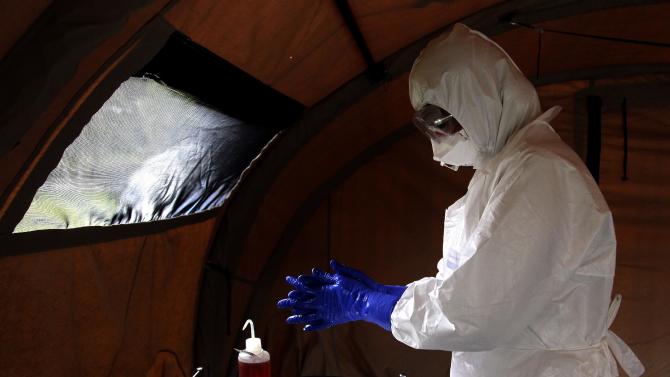 |
| In this Sept. 24, 201, file photo, nurse Dalila Martinez, trainer of the Cuban medical team to travel to Sierra Leone, washes her gloved hands during a practice drill at a training camp, in Havana, Cuba. Cuba's health ministry is sending more than 160 health workers to help stop the raging Ebola outbreak in Sierra Leone in early October. Cuba says a member of the 165-member medical team it sent to fight Ebola in Sierra Leone has been diagnosed with the disease. (AP Photo/Ladyrene Perez, Cubadebate,File) |
A member of the 165-member medical team Cuba sent to fight Ebola in Sierra Leone caught the disease when he rushed to help a patient who was falling over, his brother told The Associated Press Wednesday.
Dr. Felix Baez Sarria is being treated by British doctors in Africa but he will be transferred to a special unit in Geneva at the recommendation of the World Health Organization, medical officials said.
The Swiss government said Wednesday that Baez would be brought during the next 48 hours for medical treatment in Geneva. It said a private American airline had been hired for the flight and the treatment would take place in a special room that is isolated from the outpatient and treatment units at the city's University Hospital.
Baez was a military doctor who worked in the Havana army hospital where U.S. contractor Alan Gross has been held for nearly five years, his older brother, Michel Gutierrez Sarria, told the AP.
Gutierrez said he has not been in direct contact with his brother since he fell ill, but the family has been told the doctor, a married father of two, caught Ebola when he saw a sick person toppling over and his "instinct to help" kicked in, apparently prompting him to violate the strict protocols designed to protect medical workers from Ebola.
"He saw someone who was falling, and went to help them and it seems like that's how he got contaminated," Gutierrez said.
Ebola is spread through direct contact with the bodily fluids of sick patients - including blood, feces and urine. Health workers have been particularly vulnerable to contracting the virus because of their proximity to the sick. At least 570 health care workers - including 128 in Sierra Leone - had gotten Ebola as of earlier this month. The World Health Organization says 102 out of the 128 in Sierra Leone have died.
While doctors and nurses can protect themselves with gear such as aprons, masks, glove and boots, the gear must be carefully and methodically removed to avoid contamination. A small mistake can prove fatal if the fluids on the protective clothing touche a doctor or nurse's skin.
"We know he's stable and what we want is for him to get better," Gutierrez said. "My brother knew the risks of going to Sierra Leone but he stepped up and we respect his decision."
Cuba won global praise for sending at least 256 medical workers to Sierra Leone, Liberia and Guinea to help treat Ebola patients. State officials have emphasized the medics' high state of readiness for the mission, saying the doctors, nurses and support staff received weeks of instruction in protective measures and equipment.
Once in Africa, the Cubans got two to three weeks of additional training before heading into the field. They were to be quarantined in Africa for weeks at the end of their six-month mission before returning to Cuba.
State media said that Baez, an internal medicine specialist, came down with a fever of more than 100 degrees on Sunday and was diagnosed with Ebola the following day.
Cuban officials did not immediately release any other information about the case, the first reported among the health workers the island sent to Africa as part of a half-century-old strategy that puts doctors on the front lines of the country's foreign policy.
This island of 11 million people is one of the largest global contributors of medical workers to the fight against Ebola, a commitment that has drawn rare praise from the U.S. and focused worldwide attention on Cuba's unique program of medical diplomacy, which deploys armies of doctors to win friends abroad and earn billions a year in desperately needed foreign exchange.
Cuba has more than 50,000 medical workers in more than 60 countries, many in nations like Brazil that pay hundreds of millions a year for their services. Others are on humanitarian missions that generate good will abroad.
Despite a recent set of pay raises, most Cuban doctors' salaries don't top $75 a month, less than many workers in tourism or other sectors that bring in money from abroad. The foreign missions almost uniformly offer the chance to earn extra pay, in many cases enough to buy a bigger home or new car.
Critics of Cuba's communist government have accused it in the past of exploiting the doctors by giving them only a small portion of the money paid for their services and keeping the rest.
No comments:
Post a Comment